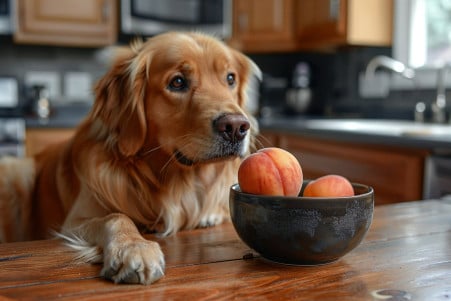Can Dogs Have Fruit Snacks? Exploring Healthy Human Food Treats
8 June 2024 • Updated 6 June 2024

So, what can we give our pups? And what should we avoid, like fruit snacks? Most fruit snacks are filled with sugar and artificial ingredients that are not good for dogs. Plus, xylitol, a sweetener often used in fruit snacks, is highly toxic to dogs and can lead to low blood sugar, seizures, liver failure and death. So, it’s probably best to avoid them and stick to dog treats that are made to meet their dietary needs.
While that directly answers the question, let’s take a deeper dive into the studies that have been done on the human foods that are safe for our furry friends to eat. We will look at research from veterinary nutritionists and other animal care experts to see the positive and negative effects of the different treats and fruits that we can give our dogs. This well-rounded view will help you know what to look for when you want to give your dog a treat, while also making sure that you are meeting their nutritional and health needs.
Can dogs eat fruit snacks?
Toxic Fruits and Ingredients to Avoid
Some fruits are toxic to dogs, including grapes, raisins, cherries, and avocados. Grapes and raisins have proved to be very toxic for dogs no matter the breed, sex, or age, and can even lead to acute kidney failure according to the American Kennel Club. While the ripened tomato fruit is generally safe, the green parts contain solanine which is toxic to dogs. Avocados contain persin, a fungicide that often causes vomiting and diarrhea when ingested by dogs.
Fruit snacks are also a concern, as they often contain grape concentrate derived from grapes, which is equally dangerous. Sugar-free varieties may swap sugar for xylitol, an artificial sweetener that is highly toxic to dogs. Any fruit pits, seeds, or stems should be avoided too, as they can pose choking hazards or contain toxins like cyanide from cherry pits. Citrus fruits like oranges, lemons, and limes can also cause digestive issues for dogs if consumed in large quantities.
In addition to these fruits, it's important to avoid feeding dogs any fruit pits, seeds, or stems, as they can pose choking hazards or contain toxins like cyanide from cherry pits. Citrus fruits like oranges, lemons, and limes can also cause digestive issues for dogs if consumed in large quantities.
As a result, fruit snacks should be avoided, as they often contain grape concentrate derived from grapes, which is equally dangerous. Sugar-free varieties may swap sugar for xylitol, an artificial sweetener that is highly toxic to dogs. Next up, we'll explore the many nutritious fruits that are perfectly safe to share.
Fruits That Are Safe For Dogs
Many fruits that are staples in your own diet, like apples, bananas, blueberries, and watermelon, can be healthy and safe treats for your dog. According to the American Kennel Club, these fruits are packed with vitamins, minerals, antioxidants, and fiber that can help improve your dog's overall health. The Forbes Advisor even lists blueberries, cucumbers, and watermelon as the best fruits for dogs.
However, make sure you remove any seeds, pits, or rinds from the fruit before giving it to your dog, as these can be choking hazards. RAWZ also suggests that you blend or finely chop fruits and vegetables to make sure your dog can absorb the nutrients in them. Plus, make sure you don't overdo it. According to RAWZ, no more than 10% of your dog's daily caloric intake should come from fruit.
To make sure you know exactly how much of each fruit you can give your dog, the next section will provide serving size recommendations for a variety of fruits. That way, you can be sure you're giving your dog a healthy treat.
Proper Portion Sizes for Fruits as Dog Treats
As noted on the RAWZ website, the 90/10 rule means that treats, including fruits, should account for no more than 10% of a dog's daily caloric intake. Purina recommends using this rule to make sure that your dog's diet is still well-rounded and healthy.
For fruits like apples, Purina says that you should limit your dog to one or two slices for smaller dogs and up to five one-inch cubes for larger dogs. Meanwhile, The Farmer's Dog says that bananas, which are a good source of potassium and other nutrients, should be limited to half a banana for larger dogs and one or two slices for smaller dogs.
As for berries, BeChewy says that you can start with 1-3 blueberries or blackberries for smaller dogs and 3-5 for larger dogs. Meanwhile, for other fruits like cantaloupe, pears, and pineapple, make sure to cut them into bite-sized pieces and remove any seeds, rinds, or cores before feeding them to your dog.
It's important to introduce new fruits to your dog's diet gradually and in small amounts, as The Farmer's Dog explains that this will help you see how your dog reacts to the fruit and adjust the portion size as needed. However, with the right care and portion sizes, you can make sure that your dog gets a variety of healthy fruits in their diet as an occasional treat.
How to Safely Introduce Fruits to Dogs
Like any new food, it’s important to introduce fruits to your dog slowly and carefully. Furhaven Pet Products suggests that you start by adding 10% or less of the new fruit to your dog’s regular meals. This will help you determine their tolerance and make sure they don’t have any negative reactions.
Mixing the new fruit with a food your dog already loves can also make it more appealing. According to ZamiPet, dogs are more likely to eat new foods if they have a strong smell. Canned or frozen fruits may be more attractive to dogs because they have a stronger scent.
It’s also important to be patient. ZamiPet explains that it can take several tries before a dog will eat a new food. If your dog has any digestive problems, like vomiting or diarrhea, after eating a new fruit, stop giving it to them and talk to your vet.
Symptoms of Fruit Toxicity and What to Do
The most common symptoms of fruit toxicity in dogs are vomiting, diarrhea, lethargy, and loss of appetite, according to the ASPCA. In more serious cases, dogs may experience kidney or liver failure, tremors, and other neurological symptoms, as noted by Daily Paws.
If a dog has eaten a toxic fruit such as grapes or avocado, it's important to call a veterinarian or pet poison hotline immediately, warns Island Life Animal Hospital. Don't try to induce vomiting or treat the dog yourself, as this can make the situation worse. Seeking professional help as soon as possible and getting the dog decontaminated can help prevent complications from fruit toxicity.
Conclusion: How to Make Fruit Treats Work for Your Dog
While most fruit treats are not a good idea because of their sugar and artificial ingredient content, there are many fresh fruits that can be healthy for your dog. However, it's important to know which fruits are safe and which are toxic, and to make sure you're giving the right portion size for your dog's size and weight. It's also important to introduce new fruits slowly and watch for any signs of a bad reaction. This is especially important if you think your dog has eaten a toxic fruit.
If you suspect this is the case, it's important to get your dog to the vet as soon as possible to avoid any serious health issues. However, with the right information and care, you can make sure that your dog gets the benefits of healthy fruits as an occasional treat.


